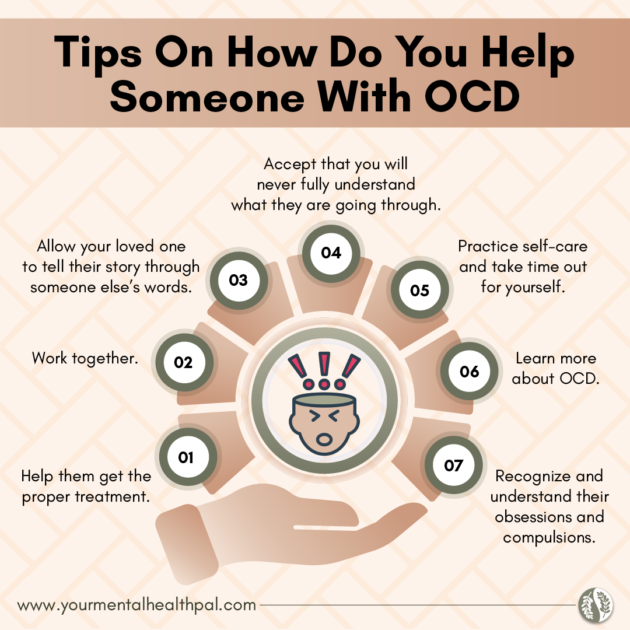Learning how to support someone with OCD can go a long way in helping them manage their condition. We have compiled a comprehensive list to guide you through the tumultuous process of living with someone with OCD.

As per the World Health Organization (WHO), obsessive-compulsive disorder (OCD) affects around one in 40 adults and 1 in 100 children in the United States. It is also one of the top 20 causes of disability in the world.
Just like most mental health disorders, OCD is extremely disruptive and debilitating in nature. It affects people’s day-to-day lives, leaving them struggling to get the smallest things done.
The impact of OCD is far-reaching and is felt in both a person’s professional and personal life.
This is why loving and living with someone with OCD is tough. Whether it’s your friend, partner, parent, child, or a close relative – understanding how to help someone with OCD is complex and might feel overwhelming at times. It can be incredibly frustrating to watch the person you love suffer and not be able to do something to make it better for them.
Relationships are, anyway, pretty daunting. But having the added pressure of living with OCD as a constant third party is a different ball game altogether.
If you love or live with someone with OCD (god bless you), patience, knowledge, and compassion will allow you to be there for them better. Learning about and participating in your loved one’s OCD management process can go a long way in supporting them. Knowing that the more you understand, the better support systems and allies you become is imperative.
To help you get started, we have compiled a list of tips on how to support a loved one with OCD.
Before we get into the whole what to do and not do while living with someone who has OCD, here’s something that we want you to know about them.
Your loved one, who has been dealing with OCD, is a true fighter. It’s okay if you can’t see or understand it from the outside, but the mental battles they continuously fight in their heads are of epic proportions. And they are trying their best, we assure you that.
So tell them you love them. Tell them that it will get better. Show them your love and support. And together, you’ll be able to get through it eventually.
That’s it. Let’s dive in!
Tips On How Do You Help Someone With OCD

1. Learn more about OCD.
How do you help someone with OCD if you have no idea what living with OCD actually means? Or worse, if they can’t explain what’s happening to them?
This is why one of the best tips on how to support someone with OCD intrusive thoughts is to educate yourself. Therefore, find out as much as you can about what living with OCD is like. Take a look at the symptoms and various subtypes of the condition. This will help you identify the triggers and compulsive patterns that drive their OCD.
To learn more about OCD, here’s a complete guide to the various aspects of OCD.
Additionally, while going through this information, understand that people’s experiences of OCD are very different from each other. Therefore, keep an open mind while consuming information.
Moreover, make sure whatever resources you refer to are solid and do not promote bias or stigma.
2. Accept that you will never fully understand what they are going through.
One of the most important tips for living with someone with mild or severe OCD is to accept that you will never fully be able to access or comprehend how they are feeling. The minds of people with OCD take them on a ride of intrusive thoughts and emotions that might seem absurd to others but are a part of their reality.
Therefore, accept your limitations. It’s okay if you don’t understand their obsessions and compulsions. But learn to be more compassionate and patient with them.

3. Allow your loved one to tell their story through someone else’s words.
One of the most complex parts about living with someone with OCD is that you never really under what’s going on with your loved one. Talking about their OCD symptoms can be one of the most challenging things for a person. Who wants to admit the most weird and compulsive obsessions their mind is conjuring inside?
Therefore, allow them to tell their story through other people. If your partner, friend, or family member hesitates to talk about their condition, suggest they find a relevant video, article, or story representing their feelings. Go through what they refer you to. Ask questions, but don’t be judgemental or overwhelming. Give them their space and time.
4. Recognize and understand their obsessions and compulsions.
OCD consists of two parts – obsessions and compulsions. Obsessions are intrusive thoughts and drive compulsions. While compulsions might initially make the affected person feel better, they worsen over time.
One of the hardest parts of living with someone with OCD is learning how to help them resist these compulsions.
Many times, while trying to understand how to support a partner or friend with OCD, people start taking part in their compulsions. This is called accommodation, and it’s pretty counterintuitive and unhealthy. Accommodation can look like:
- checking something for them,
- helping them with their compulsions,
- giving constant reassurances to validate their doubts and fears, and
- helping them completely avoid things that trigger or stress them out.
See, it’s almost natural to want to help a loved one with OCD by being there for them. However, it’s essential to devise the right ways. Here are a few tips on how to support someone with OCD intrusive thoughts and compulsions:
- Understand their trigger patterns.
- Find approaches and coping strategies that you both agree with.
- Encourage your loved one to challenge their compulsions.
- Resist giving constant assurances.
- Be patient but consistent in your methods.
- Remember that this whole process takes time and practice.
5. Work together.
Another important part of living with someone with OCD is to indulge in activities together. This gives your partner or friend a sense of companionship. It shows them that their life is more than just their diagnosis. It shows them that you care.
Therefore, when they are feeling well, plan new activities. Go out on trips, vacations, or just dinners. When they aren’t feeling great, sit with them through their distressing thoughts. Always include them in the whole planning and decision-making process to make them feel included.
6. Help them get the proper treatment.
Those living with OCD might find it difficult to reach out to a health professional for help directly. Therefore, as a partner, friend, or family member – support them through the whole process.
Find the best treatment plan for them. Assure them that their treatment is going to be completely safe and confidential. Offer to go with them to their appointments. If they are nervous or stressed about their treatment process, ask them how you can make them feel better. Actively seek advice from a mental health professional about your role in the treatment process.
Finally, one of the most essential tips on how to support a loved one with OCD through treatment is to help them look for hope. The journey is long and highly tumultuous; therefore, keeping their hopes up is important.
7. Practice self-care and take time out for yourself.
Our final tip on how to help someone who has OCD is to try loving and caring for yourself as much as you do for them. Being a constant caregiver can take a toll on you. It can get mentally and physically draining to be there for someone. Therefore, prioritize self-care.
Now, you might feel guilty for doing this. You might feel constantly responsible for your loved one, but keeping yourself healthy is just as important.
So, don’t sacrifice things that you usually like doing. If you feel the need, look for a therapist for yourself. They can guide you on how to draw healthy boundaries while living with someone who has OCD.
What Not Do If You Live With Someone With OCD

Once you have the answers to ‘How do you help someone with OCD,’ it’s imperative to understand your limitations and boundaries. While we understand that you come from a good place, it’s helpful to understand what behaviors and actions might be counterproductive to your loved one’s recovery.
Here are some DON’Ts for anyone looking to learn how to support a loved one with OCD.
1. Don’t dismiss their pain.
You never know what it’s like living with OCD until you have it. So, while you might not fully comprehend your loved one’s situation, you must always treat them with love, respect, patience, and compassion.
Don’t make them feel bad about themselves. Understand that it’s difficult for both of you; everyone is trying their best. Dismissing their feelings or symptoms would only make things worse.
2. Don’t be afraid of asking questions, and don’t be scared of the answers.
As we have mentioned before, talking about OCD is tough. People often feel embarrassed or scared about how they’ve been feeling. But it’s crucial that you ask your loved ones questions about what’s happening to them. This allows them to open up and talk about their condition.
Of course, there’s a limit to this, and you shouldn’t always burden them with questions. Moreover, don’t be scared or judgemental about their answers.
3. Don’t make day-to-day comparisons.
Your loved one might feel they aren’t making progress when they look from a narrow perspective of day-to-day comparisons. This is because these comparisons are often misleading. After all, they don’t show you your actual progress.
So, avoid letting anyone (you or your loved one) make day-to-comparison. Instead, look at the bigger picture. Tell them how far they’ve come from where they started initially.
Conclusion:
Learning how to love and live with someone with OCD is hard. It can be frustrating and overwhelming to see your loved one in pain and not be able to support them. This is why education and compassion are your best companions. Learn more about the condition and help them find the right help and support. Additionally, devise healthy mechanisms for coping and avoid enabling OCD compulsions.
We hope this blog post on tips on how to help someone with OCD will help you support your partner, friend, or family member better.
Learning to improve your tone and how you talk about OCD is extremely important. It’s even more critical when you live with someone who has OCD. To learn more about what not to say to someone with OCD, click here.
To continue learning about mental health daily, subscribe to Your Mental Health Pal.

